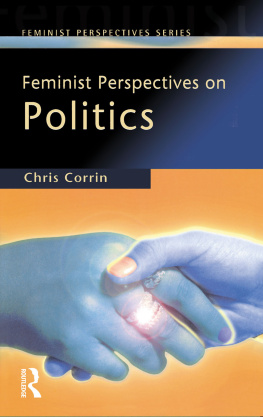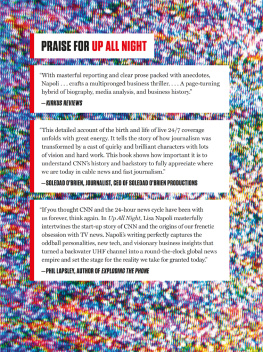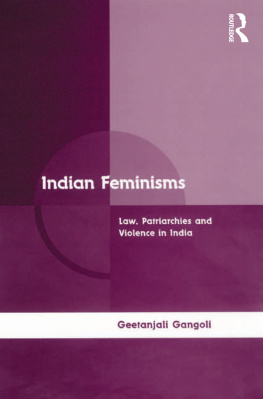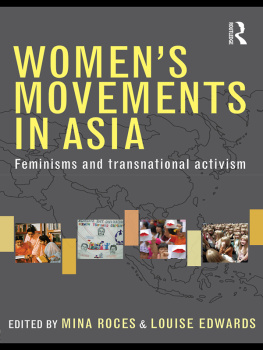2014 by the Board of Trustees
of the University of Illinois
All rights reserved
Manufactured in the United States of America
1 2 3 4 5 C P 5 4 3 2 1

This book is printed on acid-free paper.
Library of Congress Cataloging-in-Publication Data
Dow, Bonnie J.
Watching womens liberation, 1970 : feminisms pivotal year on the network news / Bonnie J. Dow.
pages cm
Includes bibliographical references and index.
ISBN 978-0-252-03856-3 (cloth : alk. paper)
ISBN 978-0-252-08016-6 (pbk. : alk. paper)
ISBN 978-0-252-09648-8 (ebook)
1. Women on television. 2. Feminism on television. 3. FeminismPress coverageUnited StatesHistory20th century. 4. Womens rightsPress coverageUnited StatesHistory20th century. 5. Television broadcasting of newsUnited StatesHistory20th century. 6. FeminismUnited StatesHistory20th century.
I. Title.
PN1992.8.W65D693 2014
305.42097309047dc23 2014002446
Acknowledgments
T his book has taken much longer to complete than I imagined when I first began to write it. As a result, the list of people who have facilitated it, in various large and small ways, is long. Its true genesis can be traced to one of my first courses in graduate school at the University of Kansas, almost thirty years ago, when Karlyn Kohrs Campbell introduced me to what she then termed the rhetoric of contemporary feminism. It was an apt label at a time when the second wave of U.S. feminism was not the somewhat distant memory it is today. Karlyn enabled my introduction to feminism as a living and breathing set of ideas rather than as a historical relic and started me on the path to my lifes work as an academic. I am indebted to her in more ways than I can express.
I am also very grateful to Bill Regier, director of the University of Illinois Press, for maintaining his interest in this project despite the fact that it took five more years to complete than I said it would; to Danny Nasset, my editor at Illinois who shepherded it efficiently and supportively through the review and revision process; and to Dawn Durante, Jennifer Clark, and Karen Hallman at the press, who were helpful in multiple ways during the journey to production. Most importantly, this would be a very different book without the generosity of the three anonymous reviewers whose suggestions dramatically improved it.
This project first took shape during the decade I spent at the University of Georgia. My initial collection of much of the news coverage that I treat in it was facilitated by a research grant from the UGA Womens Studies Program . During my time at UGA, a variety of graduate students in the Department of Speech Communication provided able and enthusiastic research assistance at various stages in this projects development, particularly Paul Achter, Cindy Dietz Skalicky, Becky Kuehl, Jon Hoffman, and Gordon Stables. I extend a special note of warmth and appreciation to the five students in the Seminar on Second-Wave Feminist Rhetorics that I taught at UGA in 2002: Kristan Poirot, Ashli Quesinberry Stokes, Wendy Atkins-Sayre, Kristy Maddux, and Tasha Dubriwny. They not only generated research and insights that have informed my thinking in multiple ways since then, but they provided one of the most satisfying teaching experiences of my career. Several of the papers produced in that seminar were subsequently published, and I have taken great pleasure in drawing on those essays in the writing of this book.
I have presented various portions of this project as invited lectures over the past decade or so, and each audience of colleagues and students has prodded my thinking in important ways. For inviting me to share my ideas and for receiving them generously, I thank the communication departments and/or the womens studies programs at the University of Wisconsin, the University of Illinois, the University of Maryland, Boston College, Northwestern University, Texas A & M University, Ohio University, St. Marys College of Notre Dame, Villanova University, Wabash College, University of Wisconsin-Milwaukee, DePauw University, Albion College, and the University of Richmond.
By the time I arrived at Vanderbilt University in 2006, this book had stalled, pushed aside by other projects, administrative work, and lifes vicissitudes. The College of Arts and Science, in particular Dean Carolyn Dever, enabled its rejuvenation and then its completion with two research leaves, for which I am profoundly grateful. In the Department of Communication Studies, I have had the great fortune to work in one of most congenial environments imaginable, and for that I thank my colleagues: Kass Kovalcheck, Vanessa Beasley, Claire King, Paul Stob, Carole Kenner, John English, M. L. Sandoz, Neil Butt, Diane Banks, and Stephanie Covington. I also thank former Vanderbilt Communication Studies major Taylor Imboden Brown for her keen research skills. Various members of the Womens and Gender Studies community at Vanderbilt have given me informal feedback on parts of this project over the past several years, and I am grateful for that as well.
In 2010 and 2011, I was privileged to participate in a yearlong seminar on Representation and Social Change at the Robert Penn Warren Center for the Humanities at Vanderbilt, an experience that enriched this project by exposing me to the smart thinking of my colleaguesabout their work and my ownfrom other disciplines. I thank Executive Director Mona Frederick and the staff of the Warren Center for their support of that seminar, and I am especially appreciative of the intellectual companionship and thoughtful feedback on my work offered by the members of the seminar, in particular Laura Carpenter, Terry McDonnell, Eddie Wright-Rios, and Anne Morey.
Julia T. Wood of the University of North Carolina at Chapel Hill, my sometime coauthor and always-dear comrade in the feminist scholarly community in Communication Studies, has been overwhelmingly supportive of this book, even when it took time away from other projects that we were working on together. She improved its introduction immeasurably, in her always gracious yet incisive style, and I thank her for that as well as for the priceless perspective she brings to my thinking about my work and my life.
John M. Murphy, my colleague at three different institutions over the years, read parts of the manuscript of Watching Womens Liberation at different moments in its evolution, and he ably acted as a nave reader when I needed smart feedback from someone who was not immersed in the second wave. He is not, however, nave about how to make an argument clearer and about how to gently correct problematic prose. I owe him a great deal for his kindnesses in these areas and many others.
Lisa Maria Hogeland, my colleague in Womens Studies at my first academic home, the University of Cincinnati, as well as my intellectual companion and beloved friend for twenty-plus years, remains my touchstone and ideal reader on all matters related to the study of the second wave of U.S. feminism. She turned her talents toward improving this book every time I asked for her help, reading almost every word of it over the years. She is my personal hero for doing so, and she made the final product much smarter than it otherwise would have been.







 This book is printed on acid-free paper.
This book is printed on acid-free paper.